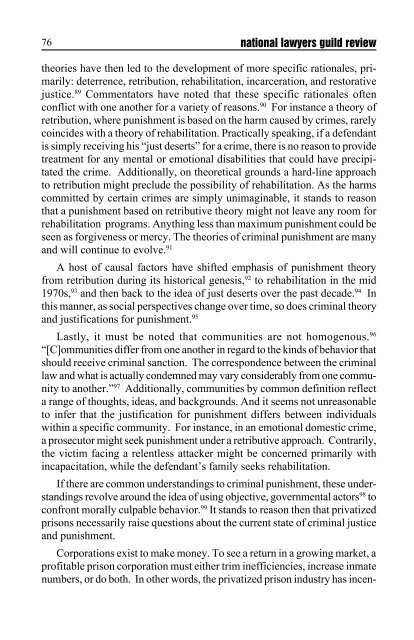Does your library have National Lawyers Guild Review?
Does your library have National Lawyers Guild Review?
Does your library have National Lawyers Guild Review?
Create successful ePaper yourself
Turn your PDF publications into a flip-book with our unique Google optimized e-Paper software.
76 national lawyers guild reviewtheories <strong>have</strong> then led to the development of more specific rationales, primarily:deterrence, retribution, rehabilitation, incarceration, and restorativejustice. 89 Commentators <strong>have</strong> noted that these specific rationales oftenconflict with one another for a variety of reasons. 90 For instance a theory ofretribution, where punishment is based on the harm caused by crimes, rarelycoincides with a theory of rehabilitation. Practically speaking, if a defendantis simply receiving his “just deserts” for a crime, there is no reason to providetreatment for any mental or emotional disabilities that could <strong>have</strong> precipitatedthe crime. Additionally, on theoretical grounds a hard-line approachto retribution might preclude the possibility of rehabilitation. As the harmscommitted by certain crimes are simply unimaginable, it stands to reasonthat a punishment based on retributive theory might not leave any room forrehabilitation programs. Anything less than maximum punishment could beseen as forgiveness or mercy. The theories of criminal punishment are manyand will continue to evolve. 91A host of causal factors <strong>have</strong> shifted emphasis of punishment theoryfrom retribution during its historical genesis, 92 to rehabilitation in the mid1970s, 93 and then back to the idea of just deserts over the past decade. 94 Inthis manner, as social perspectives change over time, so does criminal theoryand justifications for punishment. 95Lastly, it must be noted that communities are not homogenous. 96“[C]ommunities differ from one another in regard to the kinds of behavior thatshould receive criminal sanction. The correspondence between the criminallaw and what is actually condemned may vary considerably from one communityto another.” 97 Additionally, communities by common definition reflecta range of thoughts, ideas, and backgrounds. And it seems not unreasonableto infer that the justification for punishment differs between individualswithin a specific community. For instance, in an emotional domestic crime,a prosecutor might seek punishment under a retributive approach. Contrarily,the victim facing a relentless attacker might be concerned primarily withincapacitation, while the defendant’s family seeks rehabilitation.If there are common understandings to criminal punishment, these understandingsrevolve around the idea of using objective, governmental actors 98 toconfront morally culpable behavior. 99 It stands to reason then that privatizedprisons necessarily raise questions about the current state of criminal justiceand punishment.Corporations exist to make money. To see a return in a growing market, aprofitable prison corporation must either trim inefficiencies, increase inmatenumbers, or do both. In other words, the privatized prison industry has incen-












![NLGRev 68-2[1].indd - National Lawyers Guild](https://img.yumpu.com/30820772/1/167x260/nlgrev-68-21indd-national-lawyers-guild.jpg?quality=85)



